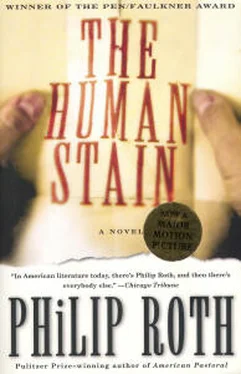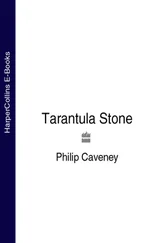“Fifteen.”
“And how did you do?”
“I won.”
“How many fights have you won so far? In tournaments. In exhibitions. How many since you began?”
“Eleven.”
“And how many have you lost?”
“So far, none.”
“And how much did you get for the watch?”
“What watch?”
“The watch you won at the Lyons Veterans Hospital. The watch the vets gave you for winning the fight. The watch you hocked on Mulberry Street. Down in Newark, Coleman — the watch you hocked in Newark last week.”
The man knew everything.
“What do you think I got?” Coleman dared to reply, though not looking up as he spoke — instead looking at the embroidered design on the good Sunday tablecloth.
“You got two dollars, Coleman. When are you planning on turning pro?”
“I don't do it for money,” he said, still with his eyes averted. “I don't care about money. I do it for enjoyment. It's not a sport you take up if you don't enjoy it.”
“You know, if I were your father, Coleman, you know what I'd tell you now?”
“You are my father,” Coleman said.
“Oh, am I?” his father said.
“Well, sure...”
“Well — I'm not sure at all. I was thinking that maybe Mac Machrone, at the Newark Boys Club, was your father.”
“Come on, Dad. Mac's my trainer.”
“I see. So who then is your father, if I may ask?”
“You know. You are. You are, Dad.”
“I am? Yes?”
“No!” Coleman shouted. “No, you're not!” And here, at the very start of Sunday dinner, he ran out of the house and for nearly an hour he did his roadwork, up Central Avenue and over the Orange line, and then through Orange all the way to the West Orange line, and then crossing over on Watchung Avenue to Rosedale Cemetery, and then turning south down Washington to Main, running and throwing punches, sprinting, then just running, then just sprinting, then shadowboxing all the way back to Brick Church Station, and finally sprinting the stretch, sprinting to the house, going back inside to where the family was eating their dessert and where he knew to sit back down at his place, far calmer than when he had bolted, and to wait for his father to resume where he had left off. The father who never lost his temper. The father who had another way of beating you down. With words. With speech. With what he called “the language of Chaucer, Shakespeare, and Dickens.” With the English language that no one could ever take away from you and that Mr. Silk richly sounded, always with great fullness and clarity and bravado, as though even in ordinary conversation he were reciting Marc Antony's speech over the body of Caesar. Each of his three children had been given a middle name drawn from Mr. Silk's best-memorized play, in his view English literature's high point and the most educational study of treason ever written: the eldest Silk son was Walter Antony, the second son, Coleman Brutus; Ernestine Calpurnia, their younger sister, took her middle name from Caesar's loyal wife.
Mr. Silk's life in business for himself had come to a bitter end with the closing of the banks. It had taken him quite a time to get over losing the optician's store up in Orange, if he ever did. Poor Daddy, Mother would say, he always wanted to work for himself. He'd attended college in the South, in Georgia where he came from — Mother was from New Jersey — and took farming and animal husbandry. But then he quit and up north, in Trenton, he went to optician's school. Then he was drafted into the army for World War I, then he met Mother, moved with her to East Orange, opened the store, bought the house, then there was the crash, and now he was a waiter on a dining car. But if he couldn't in the dining car, at least at home he was able to speak with all his deliberateness and precision and directness and could wither you with words. He was very fussy about his children's speaking properly. Growing up, they never said, “See the bow-wow.” They didn't even say, “See the doggie.” They said, “See the Doberman. See the beagle. See the terrier.” They learned things had classifications. They learned the power of naming precisely. He was teaching them English all the time. Even the kids who came into the house, his children's friends, had their English corrected by Mr. Silk.
When he was an optician and wore a white medical smock over a ministerial dark suit and was working more or less regular hours, he would sit after dessert and read the newspaper at the dinner table. They all would read from it. Each one of the children, even the baby, even Ernestine, would have to take a turn at the Newark Evening News, and not with the funnies. His mother, Coleman's grandmother, had been taught to read by her mistress and after Emancipation had gone to what was then called Georgia State Normal and Industrial School for Colored. His father, Coleman's paternal grandfather, had been a Methodist minister. In the Silk family they had read all the old classics. In the Silk family the children were not taken to prizefights, they were taken to the Metropolitan Museum of Art in New York to see the armor. They were taken to the Hayden Planetarium to learn about the solar system. Regularly they were taken to the Museum of Natural History. And then in 1937, on the Fourth of July, despite the cost, they were all taken by Mr. Silk to the Music Box Theatre on Broadway to see George M. Cohan in I'd Rather Be Right. Coleman still remembered what his father told his brother, Uncle Bobby, on the phone the next day. “When the curtain came down on George M. Cohan after all his curtain calls, do you know what the man did? He came out for an hour and sang all his songs. Every one of them. What better introduction could a child have to the theater?”
“If I were your father,” Coleman's father resumed, while the boy sat solemnly before his empty plate, “you know what I would tell you now?”
“What?” said Coleman, speaking softly, and not because he was winded from all the roadwork but because he was chastened by having told his own father, who was no longer an optician but a dining car waiter and who would remain a dining car waiter till he died, that he was not his father.
“I would say, You won last night? Good. Now you can retire undefeated. You're retired.' That's what I'd say, Coleman.”
It was much easier when Coleman spoke to him later, after he had spent the afternoon doing his homework and after his mother had a chance to talk and reason with his father. They were all able to sit more or less peaceably together then in the living room and listen to Coleman describe the glories of boxing and how, given all the resources you had to call on to excel, they exceeded even winning at track.
It was his mother who asked the questions now, and answering her was no problem. Her younger son was wrapped like a gift in every ameliorating dream Gladys Silk had ever had, and the handsomer he became and the smarter he became, the more difficult it was for her to distinguish the child from the dreams. As sensitive and gentle as she could be with the patients at the hospital, she could also be, with the other nurses, even with the doctors, with the white doctors, exacting and stern, imposing on them a code of conduct no less stringent than the one she imposed on herself. She could be that way with Ernestine as well. But never with Coleman. Coleman got what the patients got: her conscientious kindness and care. Coleman got just about anything he wanted. The father leading the way, the mother feeding the love. The old one-two.
“I don't see how you get mad at somebody you don't know. You especially,” she said, “with your happy nature.”
“You don't get mad. You just concentrate. It's a sport. You warm up before a fight. You shadowbox. You get yourself ready for whatever is going to come at you.”
Читать дальше












